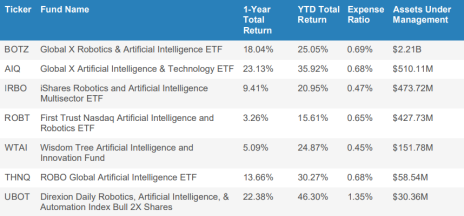Artificial intelligence stocks have inarguably been some of the best-performing stocks all year, so much so that they’ve effectively turned the S&P 500 ETF (SPY) into a de facto big tech fund.
Beginning with the arrival of ChatGPT late last year and then bolstered by Nvidia’s (NVDA) repeated monster earnings beats, artificial intelligence (AI) is largely being credited for kick-starting the new bull market.
And even after a weak August that saw some of the nascent bull market leaders suffer the worst drawdowns, AI stocks and AI ETFs are still sporting attractive returns for the year and (despite my premature call to the contrary) look poised to continue performing well through at least year’s end.
[text_ad]
So with that in mind, we’ve identified seven artificial intelligence-focused ETFs and broken them down below with an emphasis on matching the funds with different investing styles (conservative, moderate, aggressive, etc.).
But first, some caveats: The half-joke about the SPY being a big tech fund due to the overweighting of the Magnificent Seven mega-cap tech stocks is just that, a half-joke. In reality, any ETF that gives you exposure to any of the big tech companies likely offers exposure to artificial intelligence as well. Microsoft, for instance, is in the portfolio of around 500 different ETFs and is a company that is both a major investor in AI ($10 billion+ investments in OpenAI, the company behind ChatGPT) and one of the first to market with an AI-powered suite of business and consumer products.
Similarly, companies like Alphabet, Apple, Amazon, Meta, and Nvidia are all widely owned by funds and are making their own forays into AI. Even legacy automakers are spinning up their own AI units.
If you’re a moderate investor with something around 60% of your investments in equities, it’s probably safe to assume you already have low-single-digit exposure to AI. The companies mentioned above alone account for 25% of the SPY, meaning if you have “only” 10% of your equity portfolio in the S&P 500, you have at least 1.5% (10% SPY x 60% equities x 25% mega-cap tech) of your portfolio exposed heavily to the AI theme. Aggressive tech investors and growth investors may already be in the double digits.
If you’re considering upping your exposure to AI, it’s probably best to do some quick math on the investments in your portfolio and see if you already have an adequate AI allocation. If not, take a look at the seven artificial intelligence ETFs below, listed from highest to lowest assets under management (AUM).
7 Artificial Intelligence ETFs to Boost Your AI Exposure

Table and statistics courtesy of ETF.com.
Global X Robotics & Artificial Intelligence ETF (BOTZ)
The BOTZ ETF is both the largest fund on the list and the oldest, having launched in 2016. The fund boasts a 25% YTD return and an 18% one-year return but has returned a paltry 3% annually over the last five years. Like most other funds on this list, 2021 was a monster year for the fund, with shares more than doubling before last year’s bear snatched those returns away (hence the poor five-year performance).
The top two holdings of the fund are Nvidia (13%) and Intuitive Surgical (9%) and the fund is non-diversified, investing 80% of the portfolio in “exchange-listed companies in developed markets that are involved in the development of robotics and/or artificial intelligence.”
The fund’s size, history and emphasis on investing only in developed markets make it one of the more conservative funds on the list (although none of the funds are truly conservative).
Global X Artificial Intelligence & Technology ETF (AIQ)
Like BOTZ, AIQ invests in developed-market companies, but with a focus on “companies involved in the development and utilization of artificial intelligence (‘AI’) and big data” rather than AI and robotics.
The top holdings include companies you’d expect, like Nvidia, Meta, Tesla, Oracle, Apple, and Microsoft, and are less concentrated than BOTZ.
On top of being one of the best-performing funds in the last year, AIQ has produced 12% annual returns on average over the last five. If you hear “AI” and think Her (computerized intelligence and data management) and not Wall-E (smarter robots), this is the fund for you.
iShares Robotics and Artificial Intelligence Multisector ETF (IRBO)
IRBO is a more diversified fund than the prior entries and will invest globally, not just in developed markets, by investing in an “equal-weighted index of global equities involved in robotics and artificial intelligence.”
Because the fund is equally weighted, it hasn’t benefited nearly as much from the outperformance of those mega-cap tech names, returning just over 9% in the last year and 5.5% annually for the last five. Portfolio companies include names like FuboTV, MicroStrategy, and Stellantis (streaming TV, Bitcoin, EV maker) so you’ll have a wide breadth of artificial intelligence exposure, but relatively muted performance. This fund is most appropriate for investors who want broad exposure to AI as a theme in a “set it and forget it” allocation of a larger portfolio.
First Trust Nasdaq Artificial Intelligence and Robotics ETF (ROBT)
ROBT is designed to track a “modified equal-weighted index of all-cap, global companies involved in artificial intelligence or robotics,” similar to IRBO above.
The modification comes in the form of stock selection: “Stocks are classified into one of three categories: enablers (companies in advance machinery, semiconductors, or databases used for machine learning), engagers (companies offering products, software, or systems), or enhancers (companies that do not have AI/Robotics as their core business but still provide value to the industry). Stocks are then ranked based on their level of involvement in the industry, and the index selects the top 30 companies within each category. Engagers receive 60% weight, enablers have 25%, and enhancers take 15% weight of the portfolio, holdings are equally weighted within the categories.”
The fund also features the lowest one-year returns and 5.6% annual five-year returns. Because it’s equally weighted, the fund, like IRBO, will not capitalize on outsized performance of the mega-caps. The fund’s (relatively) poor short-term performance likely falls at the feet of that selection criteria, and given that it’s a core feature of the fund, underperformance could turn out to be more of a “feature” than a “bug.” You can get similar exposure via IRBO without the modification baggage.
Wisdom Tree Artificial Intelligence and Innovation Fund (WTAI)
WTAI is something of a wild card, having launched in December of 2021. The fund “provides exposure to an index of global companies focusing on AI and innovation technologies with high-growth characteristics. Selection of constituents is governed by an index committee, which handpicks companies that generate at least 50% of their revenue from AI and innovation activities, including those related to software, semiconductors, hardware technology, machine learning, and innovative products.”
The ETF has performed well year to date but is the second-worst-performing name on the list (one-year) and does not have five-year returns.
WTAI invests globally, with 75% of assets in U.S. companies, including names like Nvidia, Meta and IonQ. Ultimately, though, performance of a fund that “handpicks companies” relies heavily on the selection committee, and the lack of longer-term performance data plus the mediocre one-year returns suggests that this is one ETF that may need more seasoning (and data) while the selection committee shows what they can do.
ROBO Global Artificial Intelligence ETF (THNQ)
THNQ is another young fund, launched in May of 2020. It tracks an index of “publicly-traded companies that derive a significant portion of their revenue from the field of artificial intelligence. Stocks are selected from a proprietary database maintained by the index provider.”
Like WTAI and ROBT, the proprietary selection process could lead to out- or underperformance, and with a 13% one-year return, it certainly seems like they’re on the right track. The portfolio includes names like Nvidia, Palo Alto Networks, Splunk and Microsoft and is predominantly (85%) invested in U.S. companies.
On its face, the selection process looks like it’s picking up names that it “should” (including some names we like here at Cabot), but a sustained show of outperformance would certainly help the cause. This is also one of the smaller funds on the list, which can lead to light volume and wide bid/ask spreads. Aggressive investors could take a flyer on the ETF (a bet on their proprietary selection process) but more conservative investors may benefit from a little more performance data.
Direxion Daily Robotics, Artificial Intelligence, & Automation Index Bull 2x (UBOT)
Direxion is relatively well known as a provider of leveraged and inverse funds, and UBOT offers exposure to “firms developing and producing robots, automated products and services, and artificial intelligence. Selected companies must earn more than half their revenue from these activities, or demonstrate commitment to the space in other ways, such as investments or acquisitions.”
The ETF is designed to mimic twice the daily performance of the underlying index and is appropriate only for momentum traders, swing traders and day traders. While it’s the best-performing fund on both a one-year and YTD basis, that’s simply a consequence of timing. The fund averages an annual loss of 11% over the last five years due to the way leveraged funds work.
Longer-term investors looking to increase their AI exposure via a targeted artificial intelligence ETF would be best served by the first three names on this list.
[author_ad]

